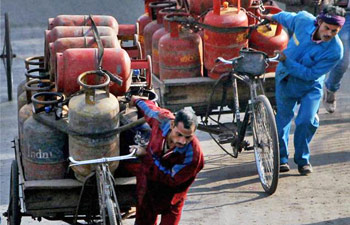![]()
 New Delhi, Jan 22: Petroleum and Natural Gas Minister Dr. M. Veerappa Moily, has approved the launch of portability of LPG connections from today onwards across oil marketing companies and distributors, covering 480 districts in the country.
New Delhi, Jan 22: Petroleum and Natural Gas Minister Dr. M. Veerappa Moily, has approved the launch of portability of LPG connections from today onwards across oil marketing companies and distributors, covering 480 districts in the country.
These districts cover all possible LPG markets which have multiple LPG distributors of various ratings.
With this, an LPG consumer in these markets can now switch to the distributor of his/her choice within a cluster of LPG distributors in the vicinity under the LPG Connection Portability Scheme.
This measure will bring great relief to those LPG consumers who are unhappy with the services of their current distributor or want to move to an LPG distributor closer to their home.
As a pilot project, the Oil Marketing Companies (OMCs) together launched LPG connection portability scheme in 24 districts covering 13 states in October 2013.
Today, this scheme is being launched on a full-fledged all-India basis by expanding its coverage to over 480 districts and a population of over 8.2 crore LPG consumers across the country.
In order to facilitate LPG consumers to benefit from the portability scheme, the OMCs have made more than 1,400 clusters distributors in over 480 districts with an average of almost 4 distributors per cluster to choose from.
The details about these clusters are available on the OMC websites. It has also been ensured that the portability scheme now covers all possible markets that are having distributors of multiple companies coupled with the scope for formation of clusters.
The procedure to opt for portability is very simple. To register for portability, the LPG consumers need to do the following:
Visit the website of the Oil Marketing company they are presently with
www.indane.co.in for IOCL
www.hpgas.com for HPCL, and
www.ebharatgas.com for BPCL
? Register themselves in the site, if not registered already
? See the distributors in the cluster and their star rating in terms of refill delivery performance
? Select the distributor of their choice from the cluster and submit request
? The consumer will receive an email confirming the registration and advising details of further procedure
? In case of Intra-Company portability request, i.e., within the same company, the LPG consumer has to visit only the new distributor with a copy of the email and get enrolled.
? In case of Inter-Company transfer, i.e. between two different Oil companies, since the LPG equipment is not compatible across companies, the consumer will have to visit the current distributor and surrender the cylinder and pressure regulator, collect the refund/transfer documents and then approach the distributor of his/her choice for reconnection by paying the same deposit as earlier.
? No Transfer fee or additional security deposit will be charged for transfer of connection under the portability scheme.
The success of this scheme lies in conferring the power with the consumer to be able to change the distributor and the oil company, which forces the distributor and oil company to perform and not in large number of portability requests.
This initiative is expected to usher in improvement in customer service by fostering healthy competition among each cluster of distributors. Proactive electronic tracking of every portability request is in place right up to its closure to ensure that LPG consumers do not face any difficulty in moving to the distributor of their choice.






Comments
Add new comment